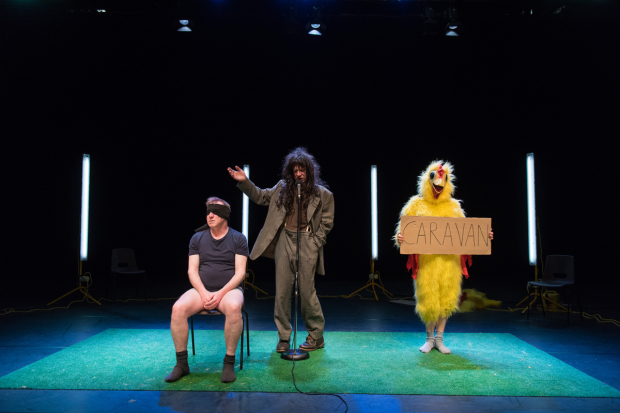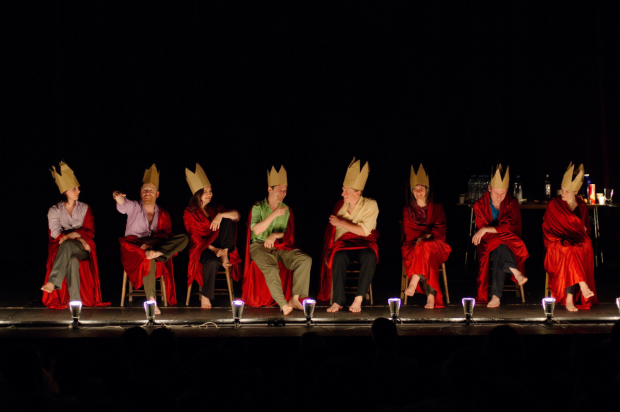Review: Real Magic (Arnolfini, Bristol)

© Hugo Glendinning
Insanity, as Einstein said, is doing the same thing over and over, but expecting a different result. It holds true in Forced Entertainment‘s new show. For a whole 80 minutes, three people run the same magic trick on repeat, a telepathy routine. They guess the same words every time, and each time, they’re wrong. Even so, they still hold out hope. Maybe this time, the magic will kick in. Maybe 'money' will finally be the right answer.
Forced Entertainment are on a roll. The company’s won some of the biggest awards in world theatre of late. The Spalding Gray Prize last year, then the Ibsen award, and now selection for Theatertreffen, German theatre’s 'best of' festival. It’s a rare feat for British artists, and richly deserved. Real Magic is their funniest show in years, but as its three maniacs wait for their miracle, it becomes a potent expression of our rudderless times. As late-capitalism crumbles, we’ve no new answers – only an old trick that no longer works.
Sitting squarely in Forced Ents’ sweet-spot, Real Magic runs a classic seaside routine over and over. A scruffball magician talks us through the trick. "This is how it’s going to work," he insists. A volunteer sits, blindfolded, ready to guess a word, and an assistant in a chicken costume holds up a sign with the word on their mind: 'Caravan' or 'Algebra' or 'Sausage.' Three guesses come, one by one. "Electricity?" Nope. "Hole?" Nope. "…Money???" Wrong. That’s it. The trio swap roles, change their clothes and start again. And again. And again. And again.
With repetition, of course, the emphasis changes. Canned applause or canned laughter makes all the difference, as do countdown music, string concertos and a comedy tune. The costumes shuffle so three chickens flap about, then three half-dressed humans. Tone slips and slides. A game show mutates into a hostage situation. Distraction sets in, then exhaustion. For a while, it's as if no one can remember why they’re even here. The longer they continue, the more demented they seem.
It's a kind of disintegration loop. At some point, the blindfold becomes too much of a faff. They give up on it, and even with the answer right in front of their eyes, they guess wrong. Richard Lowdon blinks vacantly. Clare Marshall grows frustrated. Jerry Killick tips from boredom to mania. The whole thing is absurd and it's agony. Ludicrous laughs give way to painful longueurs as Einstein’s insanity sets in. Still they guess 'money.' It's still not right.
Look closely and you realise how carefully it's constructed. Not just Tim Etchells' text, rich with ambiguity and irony, but the whole structure of the routine. What seems, at first glance, like an ordinary set-up – magician, volunteer and assistant – isn't actually that simple. All three are in the magician's spot: one running proceedings, another testing their telepathy, and the third confirming the success of the trick. It's a Penrose triangle that doesn't add up and, underneath it, no-one's entirely in charge. There's no magician after all. That's the trick.
Real Magic will return to the UK later this year. For details, see Forced Entertainment’s website.












